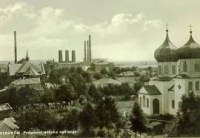When peace came, out of joy, we kept firing our guns in the air until the sky turned red.
Dobroslav Stehlík was born on the 18th of October in 1919 in Mirotín in Volhynia. The region where grew up belonged to Poland at that time, in 1939, he witnessed the Soviet occupation and in 1941, the Nazi occupation. During the German rule, the witness was conscripted to forced labour but he managed to escape and he was in hiding for some time. Along with his six brothers, he joined the 1st Czechoslovak Army Corps in Rovno in 1944. After three months of army training in Sadagura in Romania, he joined the artillery and later, he fought at the Dukla Pass. After WWII, he acquired a smallholding that had belonged to expelled Germans
